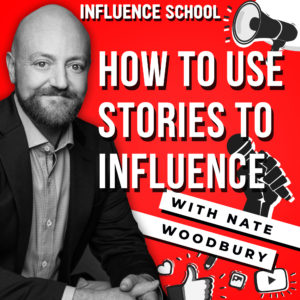
Download Now!
Although data has the power to inform people, stories have the power to change. Join Nate Woodbury and Valerie Morris as they discuss how stories influence others.
We’re talking influence again. So, of course, I invited Valerie Morris. And in this video, we’re talking about stories and how you can use stories to influence very important school that I want to learn. So that’s we’re going to talk about. So, before we talk about the how… Like why are stories influential? -Well, you know, I mean think back to your childhood. Stories are at the core of everyone’s childhood. And honestly, if you pay really close attention, stories are a huge piece of our adult life too. You go to the movies, you’re experiencing stories, you read books, you’re experiencing stories. Honestly, you’re experiencing your own story day by day. But stories are really important because they allow us to tap into things and get ourselves part of the story in a way that data just can’t do. In our world today, especially in digital marketing, data is super important. You can get so much from analytics. Whether you’re looking at YouTube videos or social media or your website stats. There’s so much information out there. But data only has the power to inform. Stories have the power to change someone. And when you can tap into a story, you can really use those data points but you can really make someone do something different. Data just gives someone some information. -Well, then I have a challenge then. Can you think of a story that really enhances someone’s influence? You know, you see maybe the before and after. -Well, you know, I don’t know if it’s one exact story but I think with nonprofits which I’ve done a lot of consulting with nonprofits. And honestly, like you encounter them on a day to day basis. The most powerful messages and the most powerful asks for money tend to be surrounded by a story. So, if you’re going to ask someone to write a check for a million dollars, you want to be able to tug at their heartstrings. And show that here’s what the impact of you giving that dollar… -I’ve got an example of a charity. -Yeah. -So, I was at I think it was it inbound in Boston last September. I can’t remember the guy’s name. But he told his stories background of being this director of clubs and being an alcohol and drug addict and whatnot and finally deciding he was going to change. So, he told his story of change. He just wanted a complete 360. He went and was on one of those medical service ships. -Okay. -He had to pay to provide service because of his background. But he did change and he ended up creating this charity called Charity Water and shows what they’ve done to bring water to impoverished nations as clean water so they don’t have disease and whatnot. -Yeah. -The story really moved me. -Yeah. -It was… It was definitely the story. And so, that’s something that that I support. So that makes a lot of sense. -Yeah. Now,, if they just said, there are X amount of billion of people that don’t have clean water. You may not have been as likely to pull out your checkbook and support that organization. -Still exists? -I actually just wrote a check the other day. I have I actually need to reorder some Genex. But yeah, I mean or your credit card. You know, but… You know, because you could relate to the story and see the transformation, it made that much more of a lasting impact. It brought emotion to the statistics. That’s for sure. And then I definitely, I can think of an example of my own. Because I’m big on numbers, I’m big on stats. And for years, I’ve talked about YouTube and what’s possible. And now that I have some amazing stories that go along with it, I found that that’s what people are really inspired by him. Telling him the same things. I’m teaching the same exact strategies. But I have people, you know, come to me after I speak and to say, “That was so actionable. That was… I really appreciate that. That was really inspiring. I know exactly what I’m going to do.” And I’ve been teaching the same stuff for years. -Yeah. -Must be the stories well. -You’ll love this because your brand is Be The Hero, right? So, Donald Miller talks about story brand and he’s got this whole program. But he talks a lot about identifying who the hero in your marketing story is. And that’s what I really like you’ve done now. You take the story and you’re talking about other people who have had success as the hero. It’s not you being the hero saying, “I can do all this stuff, I can do all this stuff.” But when you can place someone else as the one who is succeeding and the hero of the story, you can really change people’s minds. They can start to picture, “Oh, well. I could be a YouTube sensation and have all this great traffic driving to my programs. I could do that.” They can picture themselves being the hero when you talk to them that way. -Very cool. So, what about somebody who doesn’t think that they have a good story? What should they do? -Well… You know, I think there’s moments where we all don’t love our story. And I think part of that comes down to embracing who you are. You know, getting true on who you are what your story is. And think through. You know, what things have you triumphed over? What accomplishments have you made? What impact have you been able to have on other people? You know, if you think really hard, you can come up with some things. So even if you don’t love your story you’re not feeling super-confident, start mapping it out like… You know, you’ve got these things. And it can be an uncomfortable process. You know, sitting and talking about the top things that you are successful at is a really hard thing for many people to do. But it can be really helpful. Especially if you’re out trying to market your services or your expertise. You have to know what those strengths are. So, a story came to mind of I was traveling to Boise. -Yeah. -And I was thinking that I didn’t have any good stories to tell. I was trying to like, “Well, what’s what’s my compelling story that I could put in a speech?” And Doug and I were traveling to Boise. And he was really good at asking questions. And he asked questions about how I started my company. And he was totally fascinating like, “Wow! What a story.” And I… And then I told him about the experience that I had of working with Craigslist and how I got so many leads, advertising all across the country. Then he was just like, “Well, that was… That was interesting. That’s a crazy story.” And then he kept…He kept telling me everything I was telling him was these amazing stories and like, “I guess I do got stories.” Didn’t know they were so amazing. But that was… That was a really good experience. And so, I’ve learned that I’ve got to find Doug’s. That can find my stories that I don’t that I don’t see. -Yeah. Yeah. Asking questions can be really helpful and having people in your life that ask a lot of questions to you can be helpful as well. But yeah, getting used to asking questions to other people can be a good way of just getting used to talking in that way. And then maybe you could ask those questions to yourself. -So, I’ve noticed that lately, when people are sharing stories, people are willing to be a little bit more vulnerable. Why do you think that that’s so effective? -Well, so I think when you are able to open up about something very real, raw, hard, people will respect that. They realize that, “Hey, this is something that was probably really difficult to share.” But not only that, so they have a respect for you first off. But not only that but they also recognize that they might be able to relate to that and they haven’t necessarily shared that with other people. So, you know, mental health is something that people are talking about a lot more these days. The more someone opens up about depression, the more likely someone else who’s struggling with depression but hasn’t told anyone is going to be willing to talk to someone or talk to that person who shared originally. So, that’s a pretty serious example but it could be anything in terms of, “Hey, I wanted to sell on Craigslist too.” And they know that you do that. And they hear your story, they sit there and they can relate. They can put themselves in your shoes and see, “Hey, I could do something and put my own spin on it.” You know, so when you share stories, you invite someone to kind of imagine and relate in a way that simply sharing facts doesn’t allow you to do. I think stories help activate the mind a little bit more on a deeper level and allow us to tap into things like emotions and like relatability that you just can’t do when you’re just sharing facts. -Now, I really understand that there’s real power and storytelling. And I want I want to improve my story. Do you have any resources you could recommend for me and for others watching that want to improve their storytelling ability? -Honestly, story brand is a great website. Donald Miller has put together some great resources. There’s a ton of free resources there and there’s also a ton of paid resources. And I know that you can also always do some searches and find people who are certified in his training who can help you write copy. But you know, if you’re just trying to get clear on your story, go check out their website. There’s a lot of great free resources. -Well, thanks for joining us on this episode. I definitely want to recommend Valerie Morris’ book. We’re All Ears. You can find it on Amazon. Be sure to subscribe because we’ll be back tomorrow.
